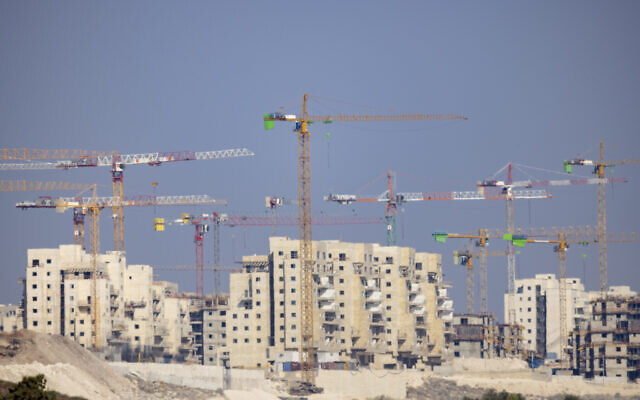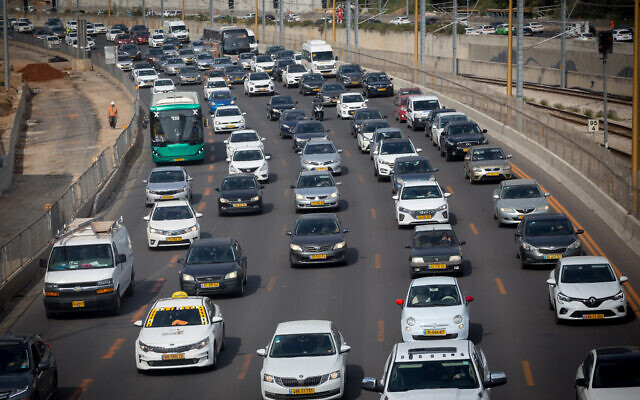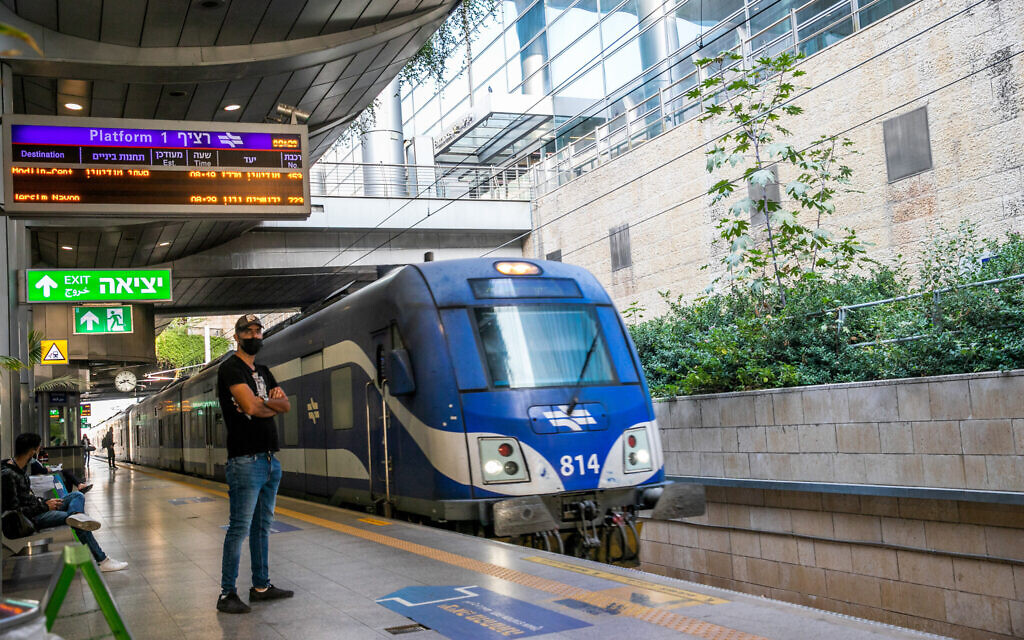T. Belman. Sounds good to me.
As the coalition finally gets a state budget approved, Israelis can expect major changes in education, consumer prices, transportation, and healthcare
Passengers at Ben Gurion train station near Tel Aviv on October 28, 2021. (Yossi Aloni/Flash90)
The Knesset passed Israel’s first budget in over three years early Thursday morning, approving a series of bills ultimately meant to guide spending until the end of 2022.
Lawmakers voted 61-59, along coalition-opposition lines, to approve the 2021 state budget in final readings just after 5 a.m. Thursday, following an all-night session that they expect to repeat over the coming 24 hours to pass more budget items as part of the major package for 2022.
Prime Minister Naftali Bennett said the initial passing of the budget was a “day of celebration for the State of Israel.”
The NIS 609 billion ($194 billion) spending plan for 2021 is the first budget Israel has passed since 2018, due to a prolonged political deadlock that saw successive governments fall before they could bring a proposal to the Knesset. The 2022 spending plan stands at NIS 562.9 billion ($180 billion).
The overall budget (Hebrew) marks a major reorientation of Israel’s allocation of resources and financial priorities in the coming years and is based on key principles such as streamlining government operations, upgrading public services, boosting economic competitiveness, cutting back on regulations to support growth in the private and public sectors, limiting Israel’s “non-observed economy,” or shadow economy, boosting transportation, housing, energy and technology infrastructures, and investing in human capital by training and integrating sidelined populations into the workforce.
It includes sweeping reforms of the kashrut establishment and the agriculture industry, considerable changes to import policies and processes, significant banking reforms, steep taxes on disposable plasticware which have already been implemented, and nearly $10 billion in funding over five years to improve the socioeconomic conditions of Israel’s Arab minority.
The budget also includes a broad program to boost artificial intelligence-based technologies, a housing plan to address soaring prices, and permission for commercial real estate developers to convert office space into residential units.
Finance Minister Avigdor Liberman had hailed the budget as the “most social budget in the history of the country,” in late August ahead of his submission of the proposal which also included the Arrangements Bill, to determine how the allocation of funds will be implemented.
These are some of the key economic and social elements in the program:
1. Lowering the cost of living through the easing of imports by accepting international product standards from the US and EU, without needing additional certification locally, and by enabling multiple parties to import products in parallel. Nearly all imports to the country currently require domestic regulatory approval.
This is meant to increase competition for products — electronics, food, cosmetics, toys, etc. — in the market and lower prices for consumers.
2. Reforming the agricultural sector to allow the import of produce, including eggs and dairy products from abroad. The move is meant to increase competitiveness and make a wider range of products available to Israeli consumers.
The plan also comes with a generous package of government grants for upgrading farms and infrastructure, including new tax breaks to encourage commercial investment in the agriculture sector.

Farmers block the Bilu Junction as part of protests around the country against the finance and agriculture ministries plan to open up the fruit and vegetable market for import, on July 29, 2021. (Yossi Aloni/Flash90)
A separate reform will see restrictions lifted on the export of medical cannabis, and allow the growth of the legal marijuana industry in the country.
3. Easing regulations for small and medium businesses for processes such as licensing, requests for government funding, tax payments, and access to foreign investment.
The move is meant to remove barriers to capital, streamline bureaucratic hurdles, and create a more supportive environment for new businesses as an engine of economic growth.
Israel currently ranks 35th in the world in the World Bank’s annual Doing Business report, which looks at business regulations for local companies in 190 economies. Measures include the ease of registering property, getting credit, paying taxes, trading across borders, and enforcing contracts.
4. Raising the retirement age for women to 65 (now 62) over the course of 11 years, at a rate of four months a year for three years, and three months a year for a further eight years, to increase the employment rate of older women, decrease the gender salary gap, and stabilize the funds of the National Insurance Institute.
Israel currently has one of the lowest ages of retirement for women in the world, making it harder for older women to find jobs if they choose to work and resulting in a dramatic increase in payments of elderly benefits.
5. Limiting the “shadow economy,” a subset of financial transactions that occur away from the eyes of the government, or more specifically, the Tax Authority, by introducing technological means.
The Finance Ministry said it plans to limit the size of such activity by digitizing and automating the process through which financial information is filed and handled, and by implementing a preventive model that it says will enable the identification of invoices and transactions and their approval in real-time using artificial intelligence. The ministry also said it will increase enforcement and deterrence by conducting periodic tax audits based on technological intelligence.
According to a recent study by the Taub Center for Social Policy Studies in Israel, the size of the non-observed economy in Israel declined from 14% in 1996 to 10% in 2018. A 2015 study by the OECD had put the size of Israel’s shadow economy at 19 percent, in the bottom half of OECD countries ranked from best to worst.
6. Implementing open banking reforms that are meant to inject competition into Israel’s financial sector by allowing non-banks to offer services at competitive rates, thus reducing costs for consumers, and by easing tight regulations on financial institutions.
This will help strengthen customers’ position vis-à-vis financial entities, promote the entry of advanced technological financial entities (fintech firms) into the market, increase competition in the banking system and reduce household and small business expenses in the banking system.

A man removes cash from a Bank Leumi ATM machine in the Meah Shearim neighborhood of Jerusalem (Nati Shohat/Flash90)
Israel’s banking system is highly concentrated with two main banks, Leumi and Hapoalim, dominating the industry.
7. Increasing the education budget for pupils eligible for special education services, improving accessibility for students with special needs and integrating them into regular education classes.
The Education Ministry plans to reduce educational and social gaps that arose as a result of the COVID-19 health crisis by focusing on language studies, introducing English as a spoken language from kindergarten age and developing advanced technology-focused tracks from the early grades to prepare students for a 21st-century job market.

Young students arrive for their first day of school after the holidays, at Gabrieli School in Tel Aviv, September 30, 2021 (Avshalom Sassoni/Flash90)
The ministry also plans to advance a program intended to increase school principals’ autonomy for more agile decision-making, and to supervise and oversee daycare centers for children up to the age of three, which until recently had been excluded from Education Ministry regulations.
8. Improving healthcare by focusing on general wellness, preventative medicine, and the expansion of digital access to primary care, as well as access to mental health care and services.
The Health Ministry said it plans to introduce new frameworks as possible alternatives to psychiatric hospitalization, improve hospital infrastructures and conditions, and strengthen the training of psychotherapists and psychiatrists in peripheral areas.
It also plans to promote new campaigns aimed at reducing childhood obesity, smoking habits, and bad nutrition.
A core part of the ministry’s plan will also focus on increasing the workforce in the health system, to reduce burnout and provide better care.
9. Introducing a new housing plan to increase the supply of apartments in the hopes of reducing prices and combating Israel’s spiraling housing crisis.
The government unveiled the new plan just this week, setting a target of starting construction of 280,000 homes over the next four years — significantly more than in recent years — advancing plans for 500,000 more housing units, publishing tenders for 300,000 homes on state-owned land, and having 180,000 successful such tenders.

A construction site in the Israeli town of Bet Shemesh on September 5, 2021. (Nati Shohat/Flash90)
Reforms to reach those goals include reducing bureaucracy in general, particularly for unique housing projects — such as ones that aim to demolish old buildings to rebuild new ones in their place — and projects that convert offices to residences.
Other measures listed in the plan are increasing the residence purchase tax for investors to 8%, and lowering taxes for those who build on private land.
The plan aims to invest NIS 8 billion ($2.5 billion) in developing transportation, drainage, and sewage infrastructure; NIS 5.5 ($1.75 billion) in creating new kindergartens and schools; more than NIS 2 billion ($630 million) in developing, planning and removing hurdles for new homes in the Arab community; and NIS 640 million ($202.6 million) to encourage municipalities to approve construction permits.
The cost of buying a home has been skyrocketing in Israel in recent years.
10. Overhauling public transportation by removing restrictions to enable private entities, especially employers and municipalities, to set up private transportation systems, easing the use of ride-sharing solutions as an alternative to car ownership, and providing citizens with an annual report on public transportation based on indices set up by the Transportation Ministry.
The ministry will also work to set up joint public and private sector partnerships for the development of parking spaces outside urban areas, and implement a congestion charge for drivers entering the Tel Aviv area during rush hour starting in 2024.

Traffic jams on the Ayalon highway during the Passover holiday, March 30, 2021. (Miriam Alster/FLASH90)
The plan also supports a NIS 150 billion ($46 billion) metro project in the Dan region that will lead to NIS 26-NIS 34 billion in annual savings and will create 125,000 new jobs, the ministry said.
Plans are also in the works to introduce newer, faster bus lines, pave new paths for cyclists, and improve conditions for pedestrians in city centers to encourage more walking.
The ministry also plans to recruit and train thousands of public transportation drivers, and purchase 3,500 buses over the next five years, of which 2,500 are to be electric.
11. Encouraging the transition to clean energy by boosting green electricity generation, switching to electric transportation and increasing investment in green-infrastructure projects, including constructing of solar facilities, releasing land for renewable energy projects, and boosting storage facilities nationwide.
Israel recently announced that it will join the growing number of countries pledging to be carbon neutral by 2050. The move upends the policy of the previous government, announced in April, which was to cut carbon emissions by 80 percent across the board by that year and emissions from the electricity sector in particular by up to 85%.
The Energy Ministry said it plans to guide local authorities to develop assessment plans to streamline energy consumption, and offer grants to support for energy efficiency in the business and public sectors.
12. Boosting the high-tech industry with a national program that includes approving a national artificial intelligence plan to promote the development of technologies, removing bureaucracy to encourage mergers and acquisitions and encourage investments, improving taxation, promoting ties between researchers and academics and entrepreneurs, attracting talent back to Israel from abroad, and boosting the integration of Arab workers into the tech sector.
13. Implementing kashrut reforms aimed at significantly reforming the kosher certification industry in Israel and introducing competition.
The plan, making its way through the Knesset, would establish a series of private kosher certification agencies that will be required to uphold religious standards established by the Chief Rabbinate, instead of only the rabbinate itself issuing kosher certifications.
The move is aimed at increasing competition to reduce costs for businesses seeking certification. According to a recent study by Israel Democracy Institute (IDI), Israel’s kosher certification system is riddled with inefficiencies and non-transparent processes that are costing taxpayers an approximate extra NIS 13.1 million ($4 million) per year and leading to duplicate and sometimes triplicate certifications.
Haviv Rettig Gur, Emmanuel Fabian, and Shoshanna Solomon contributed to this report.




Route 60 expansion (which is half finished) is not in the budget. Is this their way of saying screw you to thousands of citizens who live over the Green Line?
I am happy to see the new construction plan.
The rest of it seems iffy.
I don’t like the privatization trend, the easing of imports, and the deregulation.
I think Israel should work, instead, toward an independent and streamlined economy and agriculture which are sustainable for the environment which is impossible with the unrestricted imports and exports of food and other products.
With its small acreage Israel is going to allocate large production areas to totally unproductive marijuana crops for export?
Introducing the so-called competition often makes the prices higher instead of lowering them and introduces chaos into the economy – something that Israel doesn’t need.
Also, what if that private-public partnership results in, let’s say, Saudis or the PA Arabs buying up Israel’s public companies?
Why introduce a foreign language (English) into the kindergartens?
The latest research shows that most children should learn their native language exclusively up to at least the age of three years when their language abilities are getting first established.
Anyway, what do they need it for? To make it easier to romanticize an increasingly antisemitic America and to make yeridah?
Has anybody thought that a high tax on disposable plates and utensils could result in a significant increase in water usage (for washing non-disposable dishes) which Israel can also ill afford?
Otherwise, good luck, I hope it works.
Several of these “reforms” are disastrous. Enabling the government to snoop on all purchases and financial transactions by private citizens, and gather information about all citizen purchases, vastly increases the power of the state of the individual. It is essentially the same system that is now in use in China. There the government total access to all individual spending has enabled the government to give each citizen a “credit score” on the basis of whether their spending is in the national interest.
One major consequence will be a massive increase in yerida from Israel by businessment to the United States, where some states have laws that protect citizens’ privacy, even for financial transactions.
Allowing non-bank institutions to lend money led to the collapse in the Japanese economy in the 1980s, because many of the insurance companies and other non-bank institutions that entered the field did not know how to run a lending service without going bankrupt. These non-bank lending institutions also played a major role in the collapse of the U.S. economy in 2008.
Deregulation of construction requirements will devastate Israel’s fragile natural environment, promote urban sprawl, lead to the destruction of historically and artisically valuable older businesses, and increase destruction of archeological sites. Will increase, not diminish, traffic jams.
Eliminating restrictions on “medical” marijuana will have devastating consequences for the public health, and will lead to an increase in illnesses, especially for teenagers. What most people don’t understand about legalized cannibis in the U.S. is that the new permissive laws allow products with THC, a potent and dangerous chemical to be sold in concentrations much greater than “traditional” marijuana. This includes both THC drawn from oils distilled from the cannibis plant, which have higher concentrations of THC than traditional marijuana, which uses the entire plant. They also allow synthetic THC products to be sold, not made from the cannibis plant at all. This has led to an increase in the THC content of legal cannibis and canninoid products from the 3 percent of “traditional” marijuana to 40 per cent in states where this crap in legal. There has been a major increase in hospitalizations, especially of young people, as a result.
Encouraging mergers and acquisitions creates monopolies and higher prices. This is why in the U.S. the Justice Department must examine all such proposed mergers to make sure they don’t violate the Sherman anti-Trust act. Encouraging mergers and acquisitions will mean higher prices for Israeli consumers.
Providing subsidies to companies that claim to be developing new technologies and “AI technologies” will probably lead to many companies that never become profitable to receive government handouts at the taxpayers expense. It will encourage fraud and corruption by some crooked self-styled entrpreneurs who claim to be high-tech gurus.This has already happened in the United States. And it has happened in Israel as well, even before these new public financing for “high tech” companies were passed into law. For example, Gantz and his partners set up a private “high tech” corporation a few years ago, before he ran for elective office, but when he had only recently resigned his position in the Israeli military, and had retained considerable political clout in the Ministry of Defense.
The company quickly went bankrupt, costing the Israeli taxpayers millions of dollars. But Gantz and his partners were allowed to keep their millions in ill-gotten gains.
Now that both Gantz and Liberman, who like Gantz has business experience, are both high officers of state, and whose business practices were investigated by the Justic Department in the past, we can expect them to arrange huge “retirement accounts” for themselves at public expense. Probably a lot of other “entrepreneurs” and “high tech” people as well, in both the the private and public sectors.
Why should the taxpayers, most of them modestly off people who already pay higher taxes than they should have to pay, be forced to pay the expenses of private, profit-making corporations. This “socialization of costs,” of private businesses, while leaving revenues and profits in private hands, is outrageous.
But of course by far the most outrageous of these programs is the 10 billion plus dollars put into the hands of the Arab sector. The anti-Israel, pro-Palestine Arab politicians will almost certainly get most of this money into their hands. Much of it will be kicked back to the terrorist organizations and their political and NGO fronts. Much will probably be used to finance Nakba and “Land day” commemorations, and to pay people to riot against and attack Jews, burn synogogues and government buildings, etc. especially during periods of war with Israel’s external enemies. Large numbers of ant-Israel. pro-Palestine Arabs will infiltrate the Israeli civil service. The number of anti-Israel Arab college professors and public school teachers will increase. Islamic seminaries and private schools where students are indoctrinated in radical Islamist-jihadist doctrines will receive government subsidies.
This 10 billion plus dollar eqivalents in shekels in the hands of Arab politicians hostile to the state may bring about Israel’s collapse in 10-20 years, unless future governments cancel it.
I hope these plans work. Some sound good but we will see what is implemented in real world. Most Israelis are happy that a functioning government is in place.